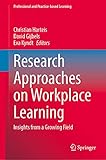Research Approaches on Workplace Learning [electronic resource] : Insights from a Growing Field / edited by Christian Harteis, David Gijbels, Eva Kyndt.
Material type: TextSeries: Professional and Practice-based Learning ; 31Publisher: Cham : Springer International Publishing : Imprint: Springer, 2022Edition: 1st ed. 2022Description: XIV, 456 p. 1 illus. online resourceContent type:
TextSeries: Professional and Practice-based Learning ; 31Publisher: Cham : Springer International Publishing : Imprint: Springer, 2022Edition: 1st ed. 2022Description: XIV, 456 p. 1 illus. online resourceContent type: - text
- computer
- online resource
- 9783030895822
- 370.113 23
- LC1051-1072
- LC1041-1048
Chapter 1. Introduction -- Part I: Individual Level -- Chapter 2. Agency: Taking stock of workplace learning research -- Chapter 3. Professional identity in changing workplaces: Why it matters, when it becomes emotionally imbued, and how to support its agentic negotiations -- Chapter 4. Research on individual learning from errors in the workplace – A literature review and citation analysis -- Chapter 5. Pointing out conceptual and measurement issues in studies on ‘learning motivation’ and ‘training motivation’ in workplace settings. A literature review -- Chapter 6. Professional Vision at the Workplace Illustrated by the Example of Teachers -- Chapter 7. Professional growth and workplace learning -- Chapter 8. Learning in and through work: Positioning the individual -- Part II: Team Level -- Chapter 9. Looking back and ahead: A social network perspective on workplace learning and professional development -- Chapter 10. Team learning -- Chapter 11. Self-regulation of professional learning: towards a new era of research -- Chapter 12. Social influences on team learning -- Chapter 13. Knowledge co-construction in teams -- Chapter 14. Advancing Research on Team Learning by Taking into Account Complexity, Dynamics and Context -- Part III: Organizational Level and Beyond -- Chapter 15. Assessment of vocational competences – definitions, issues and quality criteria -- Chapter 16. Technologies for professional learning -- Chapter 17. Vocational Education and Training in Germany—Benefits and Drawbacks of the Dual Approach as Preparation for Professional Employment -- Chapter 18. Preparing Students for the School-to-Work Transition: A Systematic Review of Research on Secondary School-Based Vocational Education -- Chapter 19. Changing appreciation of vocational learning during work – the case of the German apprenticeship system -- Chapter 20. Research on workplace learning in times of digitalization -- Chapter 21. Workplace learning from the organizational point of view.
The volume comprises a variety of research approaches that seek to explore and understand employees’ learning and development through and for work. Working life reveals challenges through technological, economic and societal development that can only rudimentarily be addressed by formal education and training. Workplace learning becomes more and more important for employees and enterprises to successfully cope with these challenges. Workplace learning is a steadily growing field of educational research but it lacks so far a scholastic canon – there is rather a diversity of research approaches. This volume reflects this diversity by bringing together researchers from different countries and different theoretical backgrounds, presenting their current research on topics that all are relevant for understanding presages, processes and outcomes of workplace learning. Hence, this volume is of relevance for researchers as well as practitioners in the field and policy makers.
